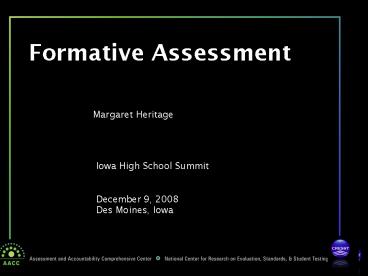Formative Assessment - PowerPoint PPT Presentation
1 / 31
Title: Formative Assessment
1
Formative Assessment
Margaret Heritage
Iowa High School Summit December 9, 2008 Des
Moines, Iowa
2
Overview
- What is Formative Assessment?
- Key Features of Formative Assessment
- The Process of Formative Assessment
3
(No Transcript)
4
A Professional Culture
- Leadership
- Collaboration
- Respect
- Transparency
- Risk taking
- Willingness to change
- Commitment of time and effort
- Reflection
5
Creating a Classroom Culture for Formative
Assessment
6
Write 3 Things You Would Include in Each Circle
Learning Culture for Formative Assessment
Teacher
Students
7
Getting Started - Small Steps
8
(No Transcript)
9
Learning Goal and Success Criteria
- Learning goal shared with students
- Criteria for success shared with students
- Goal and criteria are manageable
- Goal and criteria are in language students can
understand - Criteria made explicit through exemplars
10
Strategies to Develop Learning Goals and Success
Criteria
- Department meetings
- ? Pairs review upcoming lessons from Iowa Core
and determine LGs and SC - ? Share with colleagues for feedback and decide
on best SC - ? Subsequent meeting provide feedback on LG and
SC from implementation experience - ? Revise
11
(No Transcript)
12
(No Transcript)
13
Questioning
- More effort has to be spent in framing
questions that are worth askingthat is questions
which explore issues that are critical to the
development of students understanding.
14
Questioning
- Department meetings to agree on
- What are the important questions in this
unit/topic that will scaffold learning? - How will these questions increase in challenge?
- What kind of thinking will be revealed by these
questions? - Trial and revise
15
Improving Questions (Tuffin, 2003)
- Which word is used to describe energy types such
as elastic, chemical and gravitational? - What is a good characterization?
- Which of these two questions do you consider to
be the better one?
16
Improving Questions (Tuffin, 2003)
- Which word is used to describe energy types such
as elastic, chemical and gravitational? - Why is the word potential used to describe
energy types such as elastic, chemical and
gravitational energy?
17
Improving Questions (Tuffin, 2003)
- What is a good characterization?
- What do we need to consider before deciding how
to characterize the mother in this novel?
18
Improving Questions (Tuffin, 2003)
- Which of these two questions do you consider to
be the better one? - Why do you consider one of these questions to be
better than the other?
19
Classroom Strategies for Questioning (Clarke,
2005)
- Increase wait time
- No hands up
- Talking partner discussions
- Students quickly jot down thoughts
20
(No Transcript)
21
(No Transcript)
22
Interpreting Evidence
- Sharing evidence
- Discussing interpretations against success
criteria
23
(No Transcript)
24
School Feedback Policy
- Provides consistency across school
- Legitimates value of oral feedback
- Removes teacher guilt about not marking and
grading every piece of work - Enables feedback about successes and improvements
- Provides clarity about when to give grades
25
Developing Skills in Giving Feedback
- Review same piece of work, give feedback and
discuss - Paired in class observations
- Examine written feedback against success criteria
- Review student improvement efforts as a result of
feedback - Share examples of comment marker (success and
improvement) - Ask students opinions about the value of the
feedback
26
Marking Techniques for Formative Assessment
- Range marking
- Sample marking
- Comment marker marking (successes/improvements)
- Acknowledgement marking
- In-depth selected items marking
- Marking together
- Self- and peer-marking
27
Involving Students Peer- and self- assessment
- Students need to be trained
- Ground rules about peer-assessment
- Success criteria are the focus of assessment
28
Involving Students
- Provide ground rules
- Introduce in stages
- Whole class feedback on exemplars
- Students identify own success and improvement
opportunities - Teacher modeling
- Templates for scaffolding peer-assessment
- Practice
29
Ground rules
- Write down three ground rules you think are
important to establish for peer-assessment
30
Getting Started - Small Steps
31
Margaret Heritage mheritag_at_ucla.edu































